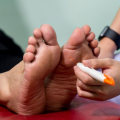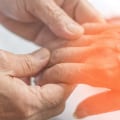If your lab tests show that there is no underlying condition,. Care at Mayo Clinic · Doctors and departments · Anti-seizure medications The goals of treatment are to manage the condition that causes neuropathy and relieve symptoms. If laboratory tests show that there is no underlying condition, your doctor may recommend careful waiting to see if your neuropathy improves. The effective prognosis and treatment of peripheral neuropathy largely depends on the cause of nerve damage.
For example, peripheral neuropathy caused by vitamin deficiency can be treated, or even reversed, with vitamin therapy and an improved diet. Similarly, nerve damage caused by alcohol abuse can often be stopped and improved by avoiding alcohol. Peripheral neuropathy caused by toxic substances or medications can often be corrected in the same way. When neuropathy is related to diabetes, careful control of blood sugar levels can slow its progression and slow symptoms.
Treatment begins with identifying and treating any underlying medical problems, such as diabetes or infections. Treatment of peripheral neuropathy may include treatment of any underlying cause or symptoms. Treatment may be more effective for certain underlying causes. For example, making sure diabetes is well controlled can help improve neuropathy or at least prevent it from getting worse.
Treatment of foot neuropathy is aimed at relieving pain and restoring sensitivity to improve the patient's function and quality of life. There is no cure for peripheral neuropathy, but proper treatment will slow progression and address your symptoms. If the cause of foot neuropathy is known, treatment of the underlying cause may provide relief. Unfortunately, 33% of the time podiatrists do not know what causes neuropathy and should treat only the symptoms.
Once neuropathy develops, few types can be completely cured, but early treatment can improve outcomes. Some nerve fibers can slowly regenerate if the nerve cell itself is still alive. Eliminating the underlying cause can prevent future nerve damage. Good nutrition and reasonable exercise can speed healing.
Quitting smoking will stop the blood vessels from constricting, so they can deliver more nutrients to help repair injured peripheral nerves. Mild pain can be relieved with over-the-counter pain relievers. For patients who have more severe neuropathic pain, anticonvulsants or antidepressants are commonly prescribed; their action on the central nervous system may calm overactive nerves. Topical patches that act through the skin, for example, by administering the anesthetic lidocaine or capsaicin with chili pepper extract, may also provide some relief.
Another option is the administration of a local anesthetic and steroid blockades (cortisone). When pain doesn't respond to these methods, alternatives may include cannabinoids or opioid analgesics. If these measures are ineffective, in a small and select group of patients, opioids can be introduced gradually after careful consideration of concerns and side effects. For some patients, a treatment regimen will also include physical or occupational therapy to rebuild strength and coordination.
Peripheral nerves have a great healing capacity. Even though it may take months, recovery can occur. However, in some situations, the symptoms of neuropathy may decrease, but not disappear completely. For example, nerve injury caused by radiation often does not recover well.
Neuropathy caused by chemotherapy is also difficult to cure, and recovery can take anywhere from 18 months to five years or more. During recovery from platinum-induced neuropathy, patients may suffer from increased symptoms. Treatments depend entirely on the type of nerve damage, symptoms and location. Your doctor will explain how nerve damage is causing specific symptoms and how to minimize and control them.
With proper education, some people can reduce the dose of their medications or manage their neuropathy without medication. Definitive treatment may allow functional recovery over time, as long as the nerve cell has not died. NINDS-funded research ranges from clinical studies of the genetics and natural history of hereditary neuropathies to discoveries of new causes and treatments for neuropathy, to basic scientific research on the biological mechanisms responsible for chronic neuropathic pain. The Inherited Neuropathies Consortium (INC), a group of academic medical centers, patient support organizations, and clinical research resources dedicated to conducting clinical research on Charcot-Marie-Tooth disease and improving care for people with the disease, seeks to better characterize the natural background of several different forms of neuropathy and identify genes that modify the clinical characteristics of these disorders.
Symptoms in diabetic polyneuropathy and other generalized neuropathies usually begin in the hands or feet and ascend towards the trunk. . .



